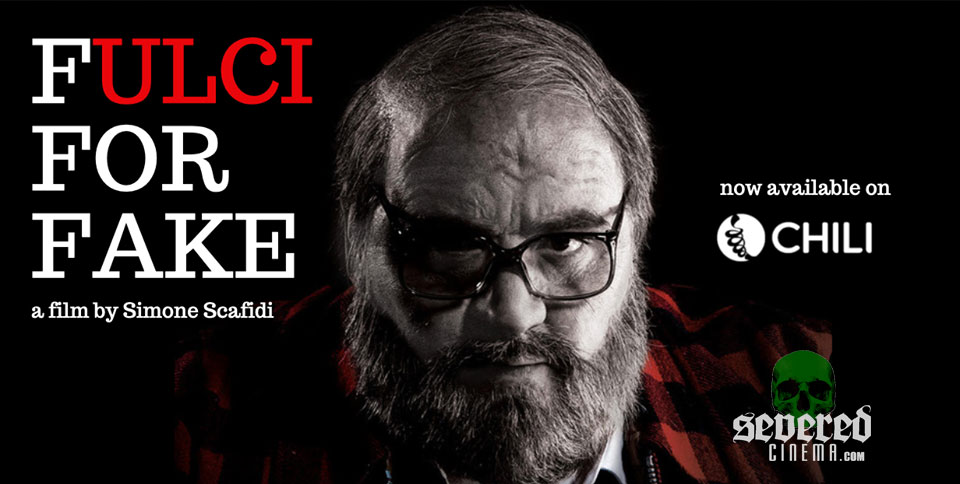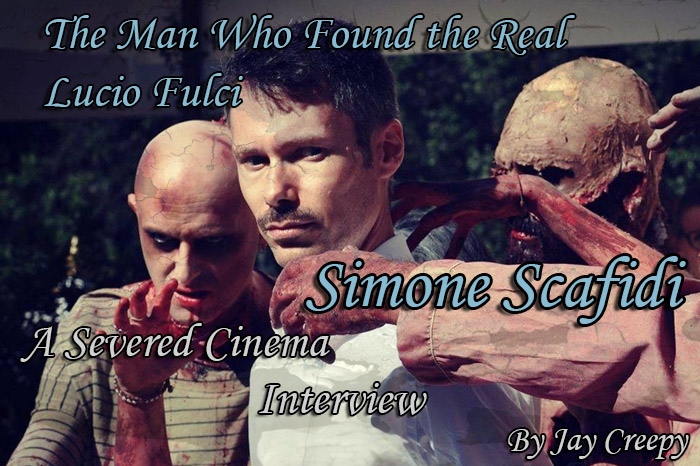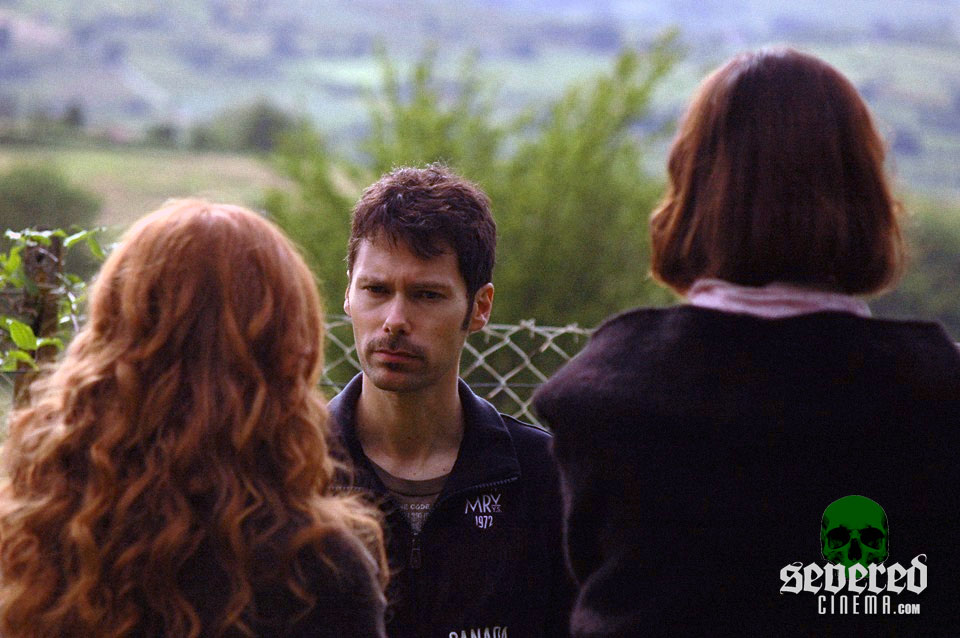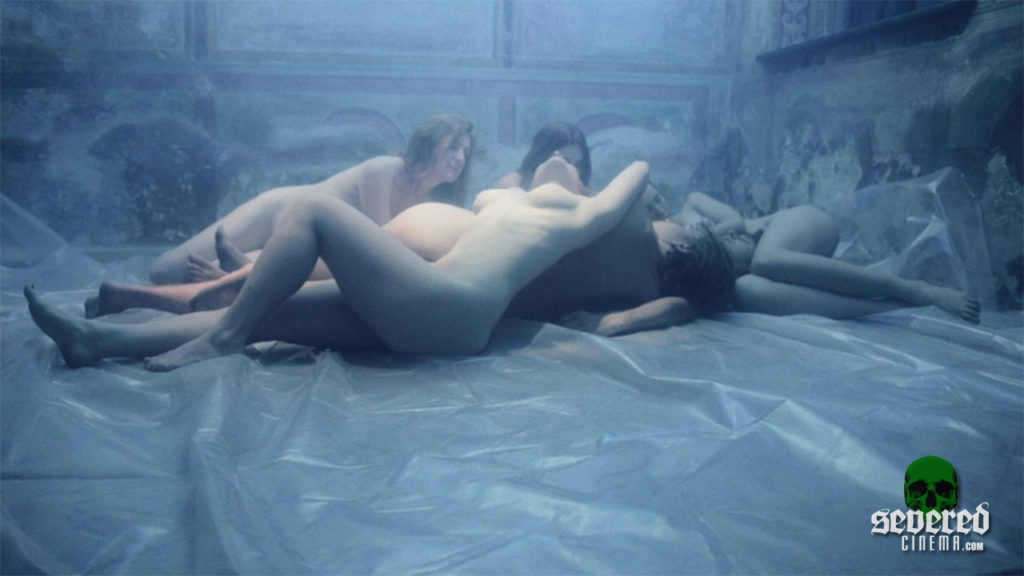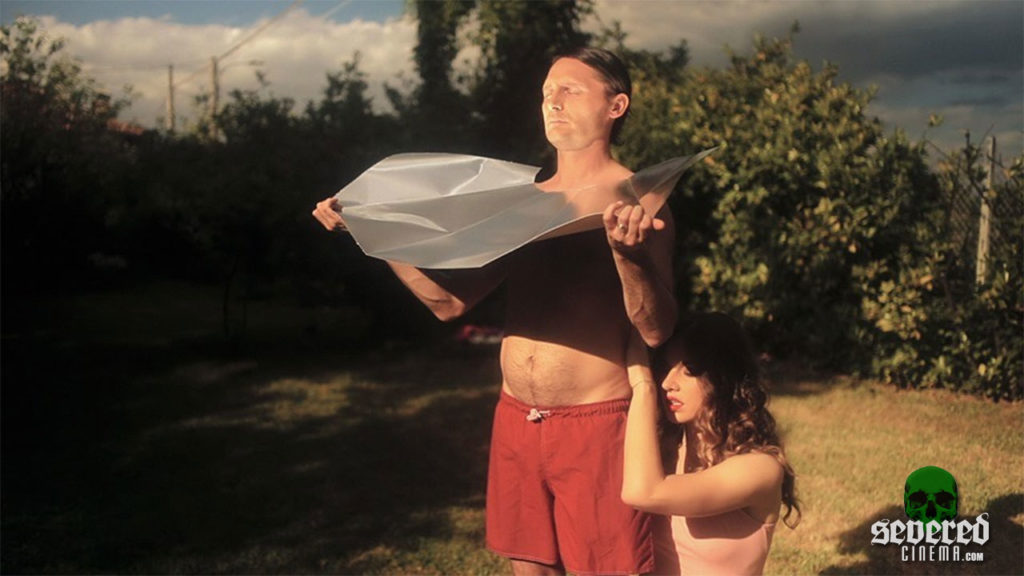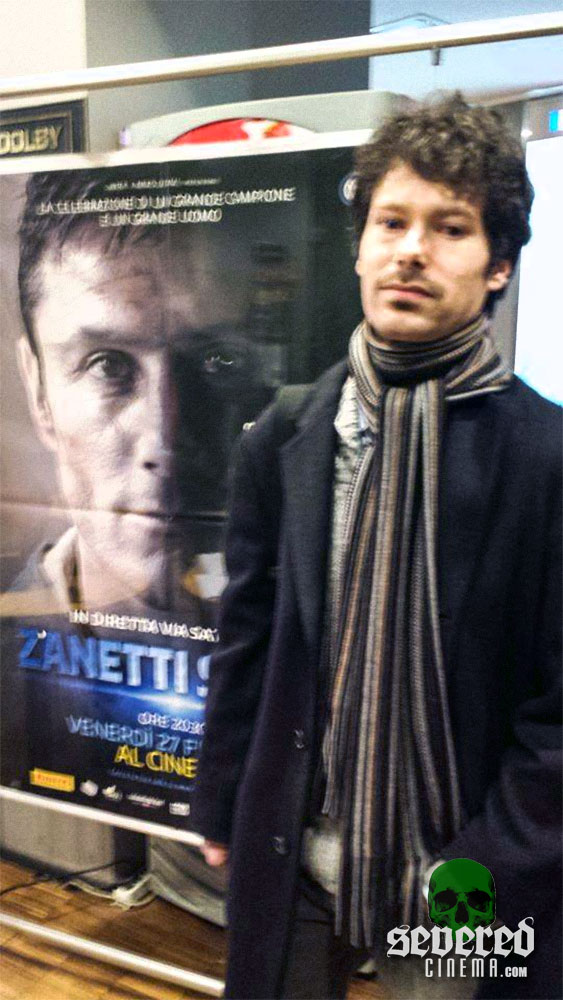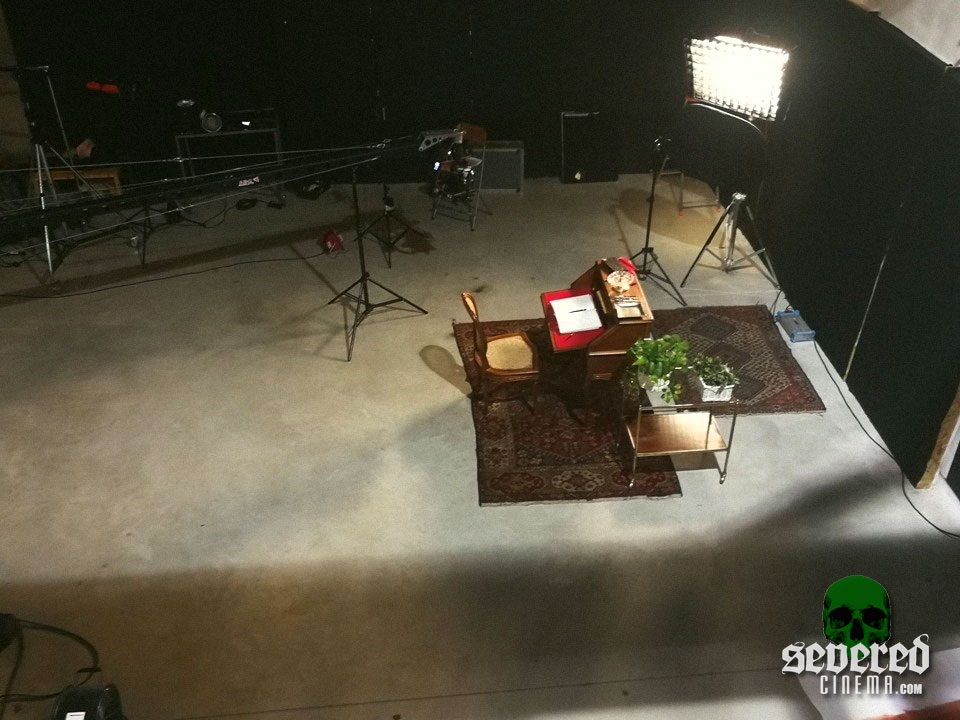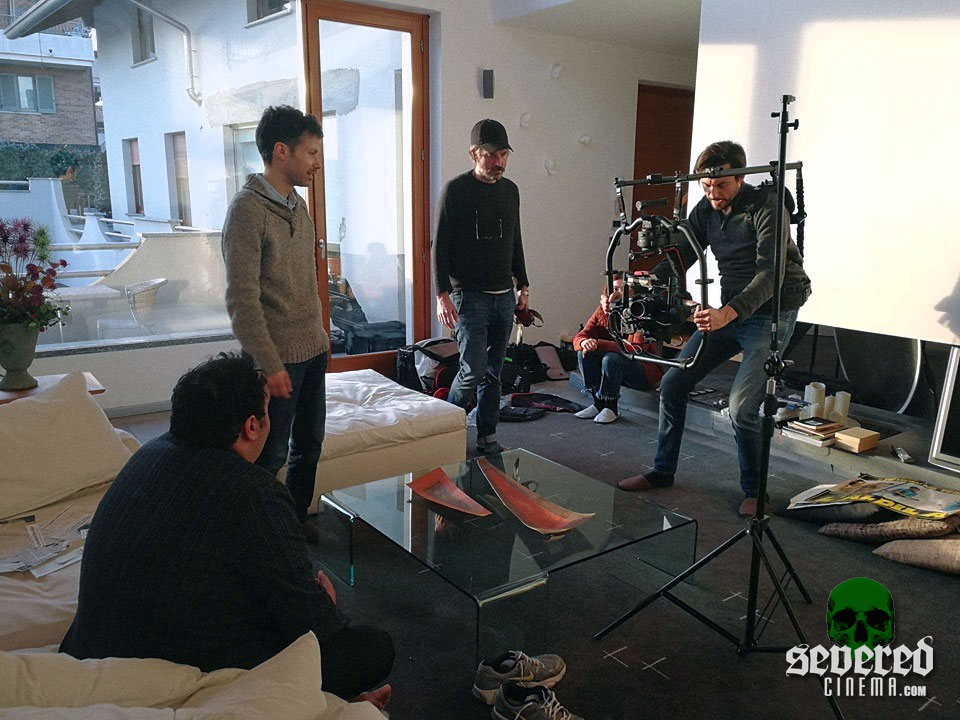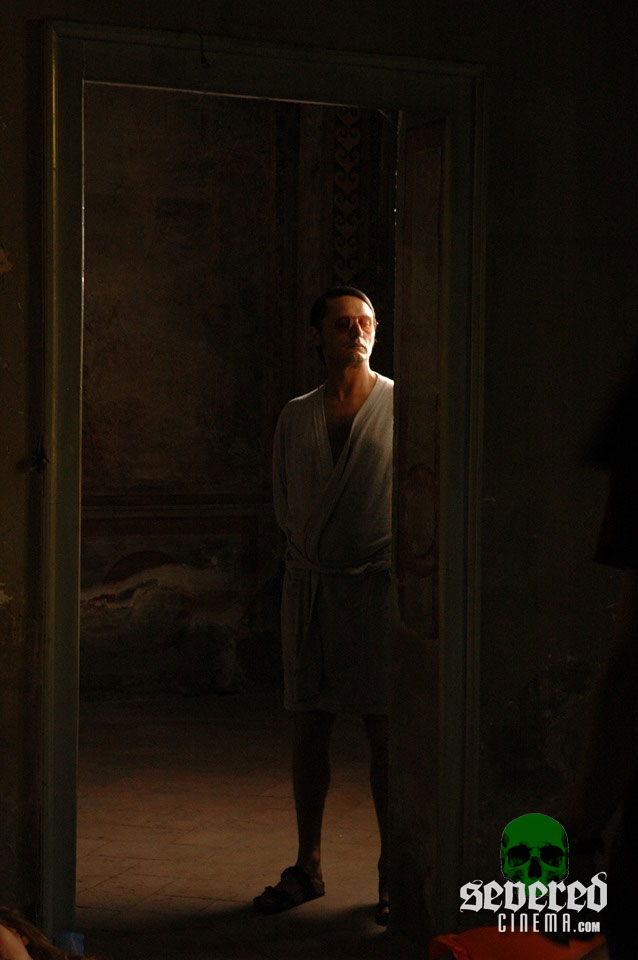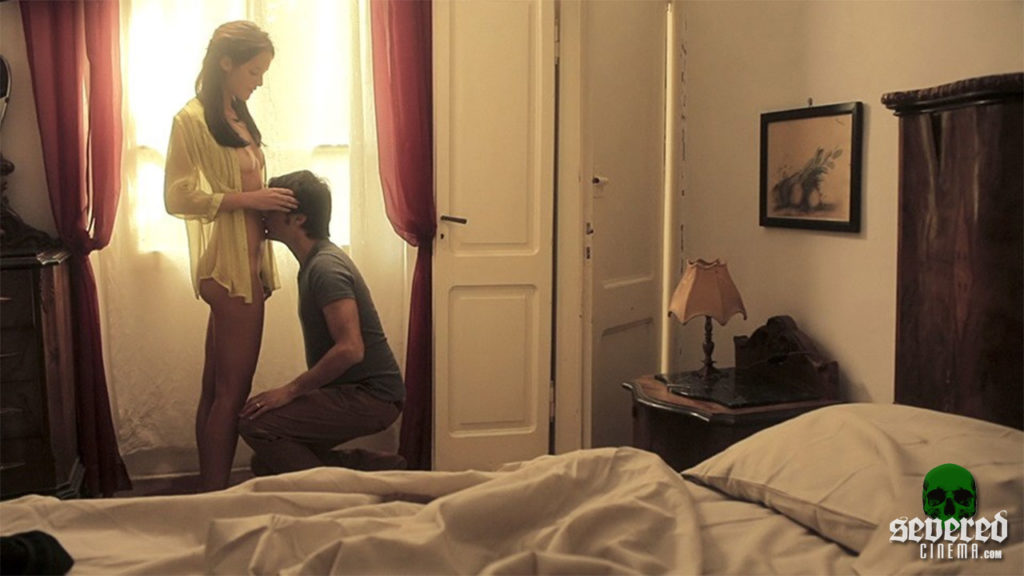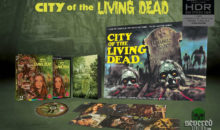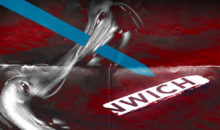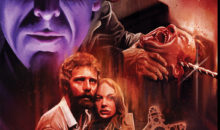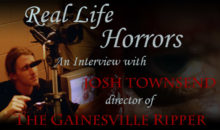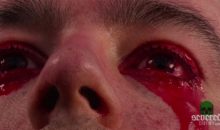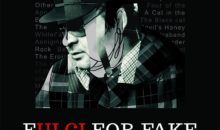The Man Who Found the Real Fulci: An Interview with Simone Scafidi!
I’ll admit to knowing nothing about Simone Scafidi until discovering a bit of information about the film, Fulci for Fake and then it opened up a nice little room for me to stare into. The way this certain biopic has been approached is very interesting and quite original, as an actor who is due to play Lucio Fulci researches the great man and speaks to many of his old comrades and such.
I am a huge Fulci fan, first discovering him in the days pre-video nasties in the UK when my Mum rented out tapes of Zombie Flesh Eaters and The Beyond. I was hooked, never to swim away from Lucio and also the huge pool of Italian horror in general.
I wrote an article about the Fulci for Fake and then decided I had to contact Simone. I wanted to find out a lot more about him and his previous movies. He was happy to oblige Severed Cinema. So here we go, let’s venture into the unknown like so many characters in Fulci’s films…..
I’ll cover a lot of aspects of your work, but obviously the biggie on everyone’s lips at the moment is Fulci for Fake. May I ask if you approached this subject from a work and business sense? Or were you a fan of Lucio Fulci beforehand?
As a director, I always try to find the right balance between what’s interesting to me and what may find an audience. Lucio Fulci is the director I love the most. I discovered his work when I was a 15-years-old living in a small town in northern Italy. I grew up watching, with my parents, American classic movies (by Hitchcock, Billy Wilder), Italian masterpieces (by Visconti, Antonioni, Fellini, Pasolini), and the American cult movies of the ‘70s — Taxi Driver, Deliverance, Straw Dogs, The Deer Hunter, and so on. We did not watch movies such as Rambo or Rocky, neither the Italian comedies of the ‘80s, that kind of stuff that my schoolmates and their families watched. The only kind of genre films we watched were the horror ones. With my parents I saw the main titles, from The Exorcist to The Shining, and on my own I watched the major directors – Romero, Cronenberg, Craven, Argento, Carpenter, Hooper, Raimi, and also outsiders like Yuzna, Gordon, Henenlotter.
I discovered Lucio Fulci in 1993, reading about him in a book about the history of horror movies. The author mainly talked bad about Fulci’s movies, but the titles of his films, The Beyond, Don’t Torture a Duckling, The New York Ripper, suggested to me a world that I would like to know. At that time, in Italy, it was not easy to find Fulci’s movies. You could just find some titles in VHS rental, but the most important, like The Beyond, Zombie, and Don’t Torture a Duckling were cut or unreleased. So, for years, I read about his movies dreaming of them. And when I finally watched them, it was love at first sight. Regarding the business matter, Lucio Fulci’s movies are known and sold all around the world. So, I guess that the answer to your question is, yes, I did.
I haven’t seen Fulci for Fake yet, so I’d like to know have you stuck firmly to facts? Or have you maybe brought the drama up a notch? I feel Lucio as a person and his life probably wouldn’t need much drama adding.
I tried to portray the man behind the director without increasing the dramatic facts, but of course without hiding them. I think that there’s a precise reason for the most original and shocking movies of Fulci – I’m referring to the horror ones – arrived at a certain point of his life, after some tragic circumstances. Fulci put in that bunch of films – from Zombie to The New York Ripper – something of his inner life. This aspect – together with his great ability in filmmaking – made them some of the most incredible pictures of the genre.
What are you upcoming plans for the film?
Fulci for Fake had its world première in the official selection of the 76th Venice Film Festival, the best première it could have. After being screened in other festivals – such as Sitges – it was released in Italian theatres at the end of October. In February it has become available in VOD platforms in Italy and in Germany, and now it’s going to be released on home video from September. In Italy and in other countries, like the USA.
Lucio was a salesman for his own legacy and it got him work. The deeper you went on, did you find yourself admiring him more? Or did anything taint his legend in your point of view?
Fulci for Fake is not a hagiographic picture. It’s made with love, passion, and gratitude towards this great director. I want to picture him as a man and as a filmmaker, trying to focus both on his virtues and on his lacks. For example, regarding the movie stuff, he shot almost sixty films but I think that only ten of them are relevant, and that the audience could easily avoid to watch his comedies or last horror movies without losing anything. I’m fond of Fulci but I’m not a blind fan. He made some great movies, really great, and lots of things with no real importance.
I read an interview with Franco Nero years ago when he claimed Lucio had told him he met JFK once and Franco realised instantly it was a lie. Is it true Lucio claimed to be a doctor previous to his film work?
In one of his books of tales, Miei mostri adorati (My Beloved Monsters), in his bio notes he gave little information, but he wrote he has been a doctor. And he said that in several interviews, also in one you can watch on YouTube, with lots of details of his career. He has never been a doctor, he never studied to become a doctor. Fulci, not only in his last years, has constantly rewrote his own story. Was he a liar? Yes, but in the way only the great ones – like Fellini – could be. Telling lies was link inventing, creating a fantastic world, as he was used to do with his movies. His life and his work were joined together out of time and free from the chains of reality.
Apparently there isn’t any film clip used in the film. Aside from, I guess, getting clearance would be a pain, were there any other reasons you chose not to include any?
Me and the producer of the movie, Giada Mazzoleni of Paguro Film, decided that we have to show to Fulci’s fans something unseen. Nowadays you can see all the major scenes of any of Fulci’s movies on YouTube. There are lots of extras on Blu-ray and DVD of his movies with sequences from all his pictures. So, besides the high costs to have the rights of his movie’s sequences, we wanted to give something never seen to the audience. We found, thanks to Antonella Fulci, home movies filmed by Fulci himself on the set of some of his movies, like Zombie and The Devil’s Honey, and from his private life. We found very rare pictures of him and also audiotapes. And, apart from this reason, I think that showing no scenes from his movies was a good choice: several spectators that do not know anything of Fulci told us, after watching the movie that listening to so much interesting things about his movies pushed them to find and see Fulci’s pictures.
How about the people interviewed for the film. From his daughters to those who worked with him. Did any of their stories move you?
Choosing the people to interview was a crucial point of this work. On one side, I want to have the classical Fulci’s closest friends and collaborators, such as Fabio Frizzi, Sergio Salvati, and Paolo Malco. But I also wanted to put in front of the camera, for the first time, people strictly linked to him but that had never talked about him. Such as Sandro Bitetto, that has been Fulci’s personal assistant. Such as Michele Romagnoli, the guy who wrote the first book on Fulci, the only one written while the director was alive and raised by a unique collaboration between Michele and Fulci. And, of course, Camilla Fulci, the daughter that disappeared, that has been hunted from all parts of the world and never gave an interview to anyone. The first thing I told to my producer, Giada Mazzoleni, was: to make this movie I want the two daughters of Fulci, Camilla and Antonella. It was not easy to do, but we succeeded in it. And the two women are the soul, the blood of Fulci that run in this movie.
Tell us anything about your central actor. For instance, how did he approach the film and the subject matter? Was he knowledgeable about Lucio beforehand?
Some years ago, I was wondering about how to make a fictional movie about Fulci, with three different narrative timelines: when he was beginning his career in the early ‘50s; when he was directing his great horrors between 1979 and 1982; the last years, from A Cat in the Brain till his death. And I immediately thought that Nicola Nocella could be the best choice for playing a young Fulci. So, when the project of Fulci for Fake started, I contacted him and, after I presented to him the way I was thinking his character, he accepted. Nicola did a marvellous work. He’s the kind of actor, very rare to find, that creates his character always letting you as a director think that the ideas comes from you and not from him. He has been very respective of my vision of the character, but it was him that make the character so real.
Nicola has a large knowledge of cinema and series. He knew of Fulci but had not seen any movie of him before starting this project, because he says that horrors frighten him. Anyway, he studied a lot Fulci’s biography and saw several movies of him. It’s important to say that he does not play Fulci, but an actor who’s going to be Fulci. So, he did exactly what his character is doing: finding information about Fulci.
How much of Lucio’s films were himself? You touched on this prior, I mean, did you truly feel he was a man who projected parts of himself into the subject matter or the characters depending on what happened in his personal life?
As I said before, I think that things that happened in his life may have influenced his work. His wife died in 1969, after he shot his first giallo movie, Perversion Story/One on the Top of the Other.The following titles, including comedies, or adventure movies, always present something cruel, something connected to the sufferings of characters. And, after Camilla’s terrible accident and after several disappointments in his job, he came out with his hard horrors, in which often the world seemed hopeless. On the other side, his latest movies, like Touch of Death or A Cat in the Brain, contain that kind of cynic humour for which Fulci was well known.
Why do you feel that his films live on? In fact, why do you feel that era of Lucio’s horror cinema remains such an important factor in the lives of those who watched them first time round or who have discovered them afterwards?
I think that today it is easier to understand the strength of Fulci’s films. When they came out, they were often confused among several horror of the time, and they were considered a sort of imitation of major movies: Zombie was a cheapest version of Dawn of the Dead, The Beyond was a sort of Inferno, House by the Cemetery was similar to The Shining and so on. Of course, these movies looked at famous models, especially in the concept, but they have a very personal style, they have both incredibly violent scenes and also some moments with a sort of unusual magic. Think of the end of The Beyond: have you ever seen something like that? Now, 35-40 years after their releases, these movies seem to be out of time, always a step forward the 95% of horror movies.
Eva Braun, one of your previous creations came out around 2015. What was the overall opinion of those who saw it?
Eva Braun was a good commercial effort. It was sold in over 20 countries. In Great Britain, for example, the movie was quite a success, both in home video than in VOD. The movie has very good reviews from the critics, but not from the generic audience who give votes on IMDb or Amazon. The reason, I think, is that it was sold as an erotic drama, while it’s a sort of tragic and ironic comedy.
And your own opinion?
It’s my favourite movie between the six I’ve directed.
What’s the story behind making Eva Braun?
I decided to make a movie about the sex scandals connected to the Italian politics of the 2010s. It’s a movie full of nonsense because it was the only way, to me, to face this stuff. And it’s also a movie full of extreme situations, especially about sex.
How were the cast to work with?
The casting for that movie was really difficult. During the preparation, Eva Braun was a movie very discussed between the actor’s agencies of Milan, because it was considered a good occasion for several young actors, but also a movie full of risks, because of the extreme situations of some scenes. There’s a scene of the masturbation of a dead dog that frighten many actors, and also people of the crew, that decided to not participate to the movie. However, nothing in the movie was written thinking to do an exploitation movie or a shocking movie. It was all studied to portray a world in which the dynamics of power bring people to do horrible things.
Be honest, if any of your casts were discussing you behind the scenes out of earshot of yourself, what do you think they’d be saying about you?
I think that if an actor is satisfied with his acting in my movie, he says wonderful things about me. If he dislikes his performance or the effort of the movie, he says bad things about me. It’s normal behaviour, an actor gives lots of himself to the director and the director should guide the actor in the right way. Anyway, I usually have a good relationship with actors, like it happened with Nicola Nocella in Fulci for Fake.
You’ve acted in a couple of films. What was your experience of being that side of the camera and how come you’ve not continued on with acting?
I’ve done only little appearances in two movies of a friend of mine, just for fun. Acting is not my job and I’m talentless.
I suppose I’d better ask about your film, Zanetti Story. I know absolutely nothing about sports as a whole, so I’ll step back, grab a cuppa and leave you to explain everything you want to about it. I’m glad it didn’t ruin your career at least. Bloody football. Was it well received?
Zanetti Story, that I wrote and directed with Carlo Sigon, is my most successful movie. It reached the first place at the Italian box office and it has become a home video long seller. The movie, about the captain of Inter Football Club, permitted me and Carlo to try new ways to make a sport biopic, mixing mockumentary with traditional storytelling.
What drives you to your subject matter? For instance, Appunti per la Distruzione?
It depends. My first movie, Gli arcangeli, was generated by the willing of making a movie about young and rich people of the part of Italy I come from, giving a portrait of them in a crude, but also moving, way. Appunti per la distruzione – another biopic, I did six films and half of them are biopics – came from reading the story of Dante Virgili, a mysterious writer who died alone and unknown (there’s no existing picture of him) and that has been discovered only several years after his death. Apart from these two movies, that are my first two, I always try to find some theme that could find and audience. Then I managed the subject my way.
Away from the world of screens and cameras, who are you? What’s a typical day in the life of Simone when you’re not working?
First of all, I’m a happy husband and a father of two children. And I’m a professor of Film Directing at the Cinema School of Milano.
To give an insight into you as a person, what films and music do you see and hear when you rest?
I see especially what might be useful to me for my cinema courses. I’m interested in all kind of movies or series. In particular, I watch products from USA, because I think that American movies and series are, especially now, the only really relevant ones. Music is important to me, both to relax and also as a sort of inspiration when I write.
Are you a book reader? If so, what’s the perfect subject?
Of course, I read as much as I can. But I’m no more trying to read a novel thinking ‘Umm, it may become a great movie’, because it’s more or less what every company and every director does. I prefer to find the right inspiration somewhere else, maybe from real life.
Who, or what, inspires you when times are up and down?
The passion of doing a job I love and my amazing family.
What’s next on the horizon?
Making another movie, of course.
If there was one thing you could change about any film you have made, what would it be?
Probably La Festa – shot in only 9 days and with several difficulties – but every movie I made, every mistake I made helped me to improve my way of directing. I think that, if I could turn back time, I will shoot again my first movie, Gli arcangeli, in a better way. Because the first movie is often what marks a director’s career forever.
Simone, thanks for taking the time out to chat. Hopefully when Fulci for Fake gets a big juicy release, Severed Cinema will be the first in line to review it (no hints there at all).
You bet!
